sponsored by the International Buddhist Psychotherapy and Chaplaincy Working Group & the International Network of Engaged Buddhists (INEB)
Wongansit Ashram, Thailand
September 29 – October 1, 2023
Overview:
This workshop provided experiential training in Buddhist chaplaincy for the first time in a Southeast and South Asian context. While chaplaincy and Buddhist chaplaincy in particular is well established in the West and has also emerged in East Asia, very few programs are available for direct study in the rest of Asia. This three-day workshop presented the principles of Buddhist chaplaincy and also offered certain key skills and practices to enable committed practitioners (ordained or lay) to serve as caregivers for those experiencing the wide variety of suffering in today’s society. Much of this suffering appears as depression, mental ill health, and suicidal ideation, yet emerges from trauma associated with study & work stress, gender and sexual identity, family trauma, social violence, tragic accidents, etc. The workshop was led by a team of seven practitioners from the two-day conference held in Bangkok. There were 21 participants largely drawn from the INEB network coming from Bhutan, India, Myanmar, Thailand, Malaysia, Cambodia, Vietnam. They ranged from monastics who run temple schools to lay practitioners studying psychotherapy and counseling. Concerns ranged from dealing with war trauma to domestic abuse, suicide, and burnout in the caring professions.
Using an innovative Buddhist model using the 5 aggregates (skandhas), the workshop led participants through a three-day process:
- Skillful Means and Acts of Translation on the Path of Care
- Mindfulness of the Body in Chaplaincy, Counseling and Being with Suffering
- Integrating Buddhist Mindfulness & Western Psychotherapy
- Maitri and Metta: Dynamic Aspects of Attunement and Compassion
- Counseling Role Plays
- Introduction to Buddhist Counseling and Chaplaincy around the World
Background:
“Chaplaincy” is an English word that has evolved in recent decades to refer to religious professionals of any spiritual tradition who have been trained to meet the specific needs of those suffering in modern institutions, such as hospitals, prisons, the military, and so forth. Chaplains serve as compassionate listeners and guides for those suffering and bring peace and meaning to their difficulties. This approach often requires a retraining of skills that are different from the more traditional religious roles as preacher and teacher of truth.
Buddhist chaplaincy has become particularly relevant and increasingly popular in recent years because the practice of meditation and mindfulness serves as an important tool in the transformation from preacher to deep listener. Meditation practice inspires and empowers the chaplain to transform the dharma they have learned in their minds into compassionate care in their hearts. It also helps to develop a powerful embodied presence to walk alongside and bear witness to the suffering of others.
This three-day workshop will present the principles of Buddhist chaplaincy and also offer certain key skills and practices to enable committed practitioners (ordained or lay) to serve as caregivers for those experiencing the wide variety of suffering in today’s society. Much of this suffering appears as depression, mental ill health, and suicidal ideation, yet emerges from trauma associated with study & work stress, gender and sexual identity, family trauma, social violence, tragic accidents, etc. The workshop will be led by a team from the International Buddhist Psychotherapy and Chaplaincy Working Group who have extensive experience in teaching and training Buddhist chaplains.
The International Buddhist Psychotherapy and Chaplaincy Working Group is a group of Buddhist chaplains, Buddhist based psychotherapists, and Buddhist activists engaged in a wide varierty of mental health issues. It evolved from the work of the International Buddhist Exchange Center (IBEC) @ Kodosan in Yokohama, Japan, which in 2006 began to work with Japanese Buddhist priests on suicide prevention. In 2017, IBEC and its partners in Japan began creating international events for Buddhists in both Asia and the West to pursue a deeper understanding of mental health issues through the creative encounter between Buddhism and psychotherapy. A major part of this group exploration has been the sharing of various practices and techniques to support not only those in suffering but those who care for the suffering.
Testimonials:
It was my first time to learn about chaplaincy which I thought was the same as a psychological course/workshop. But what I learned is that it is a kind of community practice in which everyone cares for each other’s well-being while respecting/acknowledging each other’s culture/religion. This workshop provided a safe space for me to share my mental issues, and I felt free to speak out without judgement. In addition, I learned the practical experience of counselling from experts from different religions through their role plays. It was very beneficial to me as a mental patient as well as mental caregiver. — participant from Cambodia
Schedule & Program
Thursday Sept. 28:
7:00-9:00 pm evening gathering
- Introduction of staff/teachers & review contents of 3 days with explanation of the 5 khandhas/skandha framework (MC: Jonathan Watts)

Friday September 29: BODY WORK (rupa skandha/vedana skandha)
Invocation & opening prayer/chant
Morning with Jinji Willingham
Skillful Means and Acts of Translation on the Path of Care
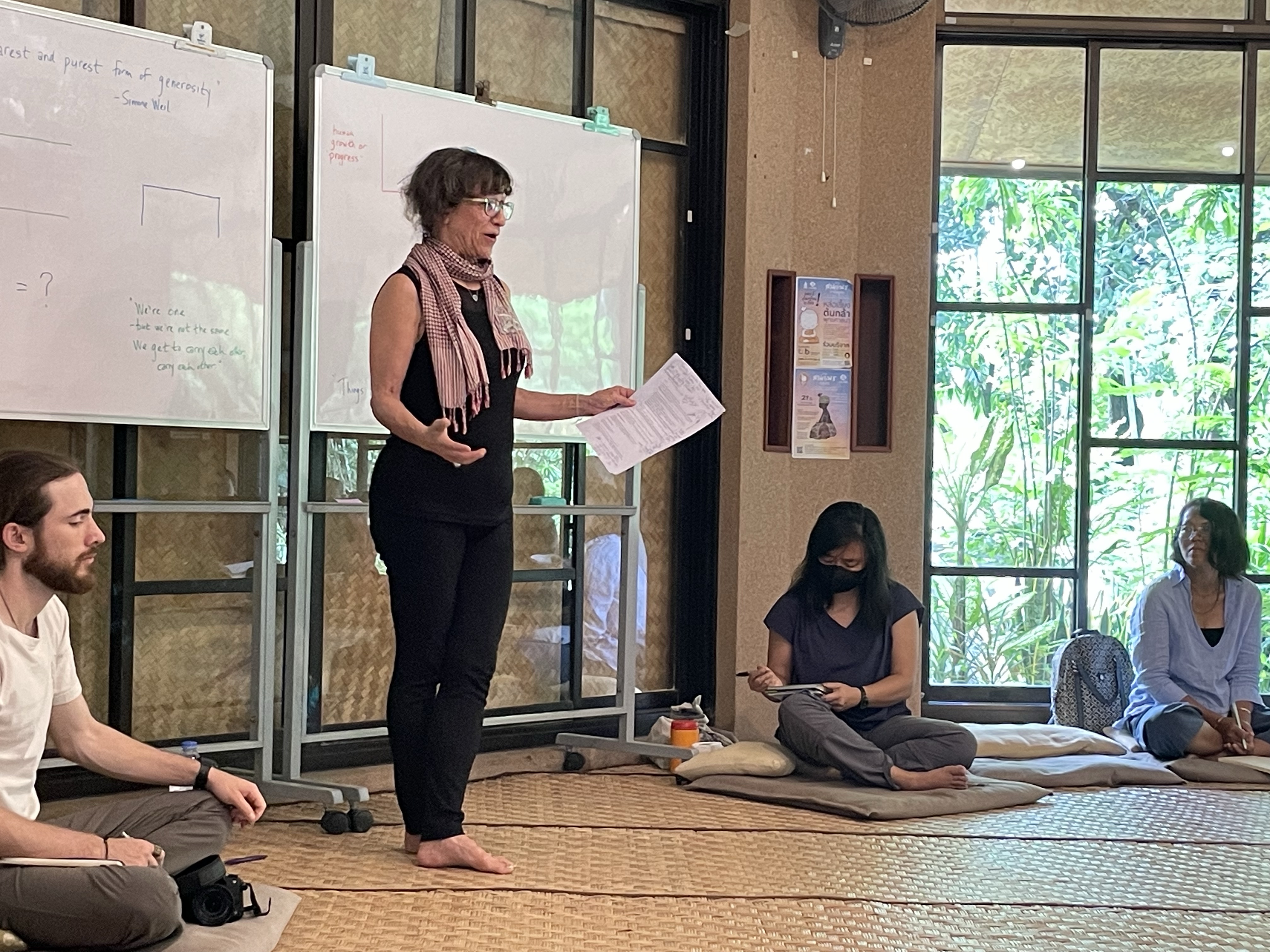 How can we skillfully and effectively incorporate and appropriately adapt Buddhist teachings in embodied work with patients dealing with psycho-emotional distress, trauma, and suicide ideation? Together we’ll consider and practice how foundational Buddhist teachings and practices can be embodied and variously expressed across a broad spectrum, which includes patients, caregivers, and places of caregiving. We’ll explore the skillful means of attuned, regulated, and engaged action in the Zen Roshi Joan Halifax’s G.R.A.C.E. model (Gathering attention, Recalling intention, Attuning to self/other, Considering what will serve, Engaging ethically). We will explore the synchronized practice of courage, vulnerability, and equanimity expressed in the phrase “Soft Front, Strong Back”. We will also learn the Way of Council, a contemplative model of group interaction that embodies the Bodhisattva Tenets of the Zen Peacemaker Order to establish the presence and space that supports deep listening and kind speech. Practices of psycho-physiology will support access to a variety of somatic experience.
How can we skillfully and effectively incorporate and appropriately adapt Buddhist teachings in embodied work with patients dealing with psycho-emotional distress, trauma, and suicide ideation? Together we’ll consider and practice how foundational Buddhist teachings and practices can be embodied and variously expressed across a broad spectrum, which includes patients, caregivers, and places of caregiving. We’ll explore the skillful means of attuned, regulated, and engaged action in the Zen Roshi Joan Halifax’s G.R.A.C.E. model (Gathering attention, Recalling intention, Attuning to self/other, Considering what will serve, Engaging ethically). We will explore the synchronized practice of courage, vulnerability, and equanimity expressed in the phrase “Soft Front, Strong Back”. We will also learn the Way of Council, a contemplative model of group interaction that embodies the Bodhisattva Tenets of the Zen Peacemaker Order to establish the presence and space that supports deep listening and kind speech. Practices of psycho-physiology will support access to a variety of somatic experience.
Afternoon with Rev. Gustav Ericsson & Cecilia Hadding
Mindfulness of the Body in Chaplaincy, Counseling and Being with Suffering
A general introduction of the important role of our bodies in different settings. The sitting meditation posture and its different aspects are very relevant to chaplaincy. Walking meditation and other grounding spiritual practices are important before being with suffering. For example, before entering a hospital room or place of trauma, how do we set and establish our bodies? How do we establish our six sense doors? For example: encountering suffering and death with our sight; listening and speaking with others through sound; being aware of triggers caused by smell; skillfully using the tastes of drink and food to connect; the appropriate use of touch with our bodies or other objects.

Evening Blessing: Baisee calling spirits back Thai festival

Saturday September 30: HEART/ENERGY WORK (vedana/sanya skandha)
Invocation & opening prayer/chant
Morning with Ven. Zinai
Integrating Buddhist Mindfulness & Western Psychotherapy
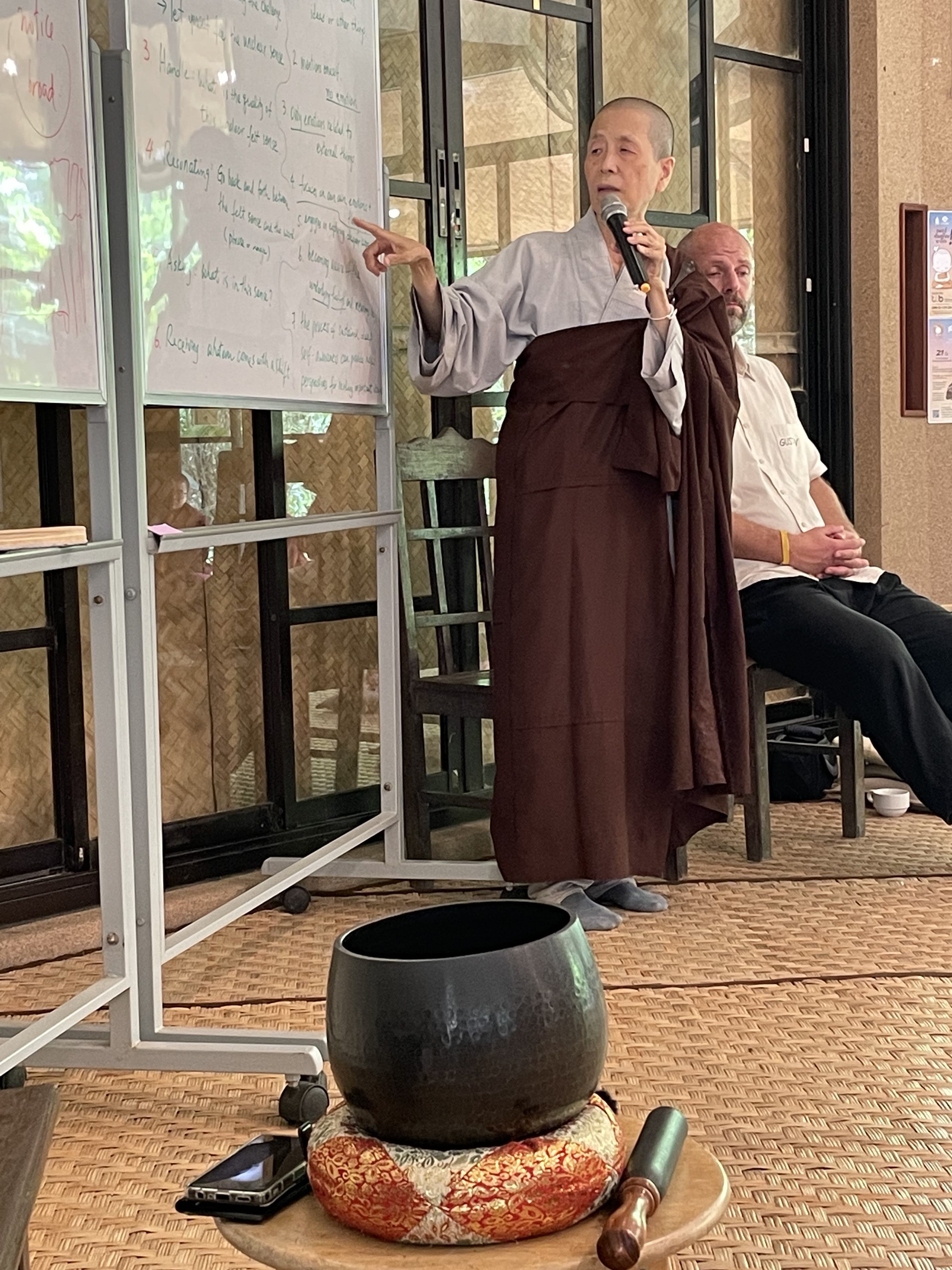 Buddhist Psychotherapy involves a dialogue between a chaplain and a client, facilitating an inner exploration of an uncharted world and signifying a new chapter in life. This session will explore the integration of Buddhist mindfulness with two Western psychotherapy techniques: Open-Focus Attention (OFA) by Les Fehmi and Focusing-Oriented Therapy (FOT) by Eugene Gendlin. This merger is designed to enhance the support provided to those grappling with various challenges, as well as to aid the chaplain. We will initially delve into the application of OFA in breathing meditation and bodily sensation. This is intended to foster a stable mental state for both the chaplain and participants, thereby creating a safe environment characterized by acceptance, allowance, and equanimity for the therapeutic process. Following this, we will introduce and practice “felt sense”, a successful component of counseling that underpins FOT. A peer-support exercise will be conducted to practice the six steps of FOT. This will provide participants with an experience of guiding clients towards a deeper exploration of their inner feelings, leading to new insights and decisions.
Buddhist Psychotherapy involves a dialogue between a chaplain and a client, facilitating an inner exploration of an uncharted world and signifying a new chapter in life. This session will explore the integration of Buddhist mindfulness with two Western psychotherapy techniques: Open-Focus Attention (OFA) by Les Fehmi and Focusing-Oriented Therapy (FOT) by Eugene Gendlin. This merger is designed to enhance the support provided to those grappling with various challenges, as well as to aid the chaplain. We will initially delve into the application of OFA in breathing meditation and bodily sensation. This is intended to foster a stable mental state for both the chaplain and participants, thereby creating a safe environment characterized by acceptance, allowance, and equanimity for the therapeutic process. Following this, we will introduce and practice “felt sense”, a successful component of counseling that underpins FOT. A peer-support exercise will be conducted to practice the six steps of FOT. This will provide participants with an experience of guiding clients towards a deeper exploration of their inner feelings, leading to new insights and decisions.
Afternoon with Elaine Yuen
Maitri and Metta : dynamic aspects of attunement and compassion
Maitri or metta is often translated as loving-kindness or friendliness, and is one of the Four Limitless Ones (brahmaviharas). This session will focus onmetta/maitri as friendship and self-care as we are present with suffering in contemporary interpersonal relations. These practices will be examined through two lenses: Maitri Space Awareness, developed by Chogyam Trungpa, as well as the Self-Compassion practices taught by Kristen Neff and Christopher Germer. Maitri Space Awareness is based on the principles of the five buddha families of Tibetan Buddhism. Each buddha family holds an aspect of enlightened as well as confused energy. In the practice, one learns how to recognize these qualities and work with them, in oneself as well as others. For example, confused energies such as fear, anger, desire, and pride, when related to directly, can be transformed into awakequalities containing intelligence, vigor, and heart. Maitri Space Awareness is a key part of the contemplative counseling program at Naropa University. Self Compassion practices have been widely disseminated in contemporary Western psychological literature. These practices are based on Buddhist teachings, but like mindfulness, have no direct reference to religious sources. We will examine and practice some of the exercises for cultivating bodhicitta, acknowledging the brahmaviharas, and practicing tonglen in relation to modern counseling and chaplaincy work.
Sunday October 1: COGNITIVE WORK (sankhara/vinnana skandha)
Invocation & opening prayer/chant
Morning
Family & Inter-Generational Trauma (power and abuse at home and in the community – sangha)
Role Plays: Teachers acted out scenarious brought up by participants with questions and critical feedback on how to engaged as compassionate counselors.
Afternoon Jonathan Watts, Brenda Phillips, Gustav Ericsson
Role Plays: continued from morning
History of and Introduction to Buddhist chaplaincy & Inter-religious chaplaincy
**extensive photos of the participants have not been provided to guard their privacy as well as the vulnerability of some to political oppression.

Guide for Life at Wongsanit Ashram

Faculty:
 Ven. Zinai (Taiwan) was ordained in 1983 by the renowned bhiksuni Master Wuyin and Venerable Xinzi. From 1985-1991 and 2003-2009, she served as a teacher at the Luminary Buddhist Nunnery founded by Master Wuyin, where she integrated Buddhist Abhidhamma studies, mindfulness meditation practice, creative education method based on Image Theory, and Satir’s Family Therapy Model. She has provided various training courses, mainly for monastics in leadership and the application of mindfulness in community service. For example, she organized a one-year training program for 5 bhiksuni to lead 50 women in a supportive course at the drug addiction rehabilitation center under the Agency of Corrections, Ministry of Justice in Taiwan. She is also the co-founder of the Buddhist Sangha Lifelong Education Society (ABSLE) in Taiwan. Presently, she is at Pa-Auk International Meditation Center in Myanmar practicing the samatha-vipassanā training course guided by Pa-Auk Sayadaw. Venerable Pa-Auk Sayadaw has developed a systematic method of training based on the Mahāsatipaṭṭhāna Sutta and the Visuddhimagga. She also holds a PhD degree from the California Institute of Integral Studies in San Francisco and studied at Komazawa Buddhist University in Tokyo.
Ven. Zinai (Taiwan) was ordained in 1983 by the renowned bhiksuni Master Wuyin and Venerable Xinzi. From 1985-1991 and 2003-2009, she served as a teacher at the Luminary Buddhist Nunnery founded by Master Wuyin, where she integrated Buddhist Abhidhamma studies, mindfulness meditation practice, creative education method based on Image Theory, and Satir’s Family Therapy Model. She has provided various training courses, mainly for monastics in leadership and the application of mindfulness in community service. For example, she organized a one-year training program for 5 bhiksuni to lead 50 women in a supportive course at the drug addiction rehabilitation center under the Agency of Corrections, Ministry of Justice in Taiwan. She is also the co-founder of the Buddhist Sangha Lifelong Education Society (ABSLE) in Taiwan. Presently, she is at Pa-Auk International Meditation Center in Myanmar practicing the samatha-vipassanā training course guided by Pa-Auk Sayadaw. Venerable Pa-Auk Sayadaw has developed a systematic method of training based on the Mahāsatipaṭṭhāna Sutta and the Visuddhimagga. She also holds a PhD degree from the California Institute of Integral Studies in San Francisco and studied at Komazawa Buddhist University in Tokyo.
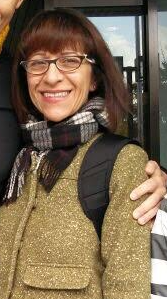 Jinji Eika Willingham (U.S.A.) is a Buddhist psychotherapist and Buddhist chaplain, and works with adolescents, adults, and family systems experiencing intergeneration/systemic trauma, PTSD, and relationship distress, as well as anxiety, depression, serious illness, and grief. She trains psychotherapists, social workers, and other caregivers in her clinical model ENSO Psychotherapy which integrates Buddhist psychology, interpersonal neurobiology, systems psychotherapy, and psycho-physiology. She worked as hospital chaplain for five years at the South Austin Medical Center supporting seriously ill/terminal patients and their families, medical ethics conversations, medical caregivers, and established a mindfulness program to support ethical and sustainable caregiving for medical staff. She studied Buddhist Chaplaincy at Upaya Zen Center in Sante Fe, NM, receiving jukai and the Bodhisattva vows from Roshi Joan Halifax in 2017, took refuge with the late Venerable Thich Nhat Hanh in 2009, and is currently a Vajrayana student in the Tibetan Buddhist lineage. She has a B.A. and M.A. in Intellectual History, is a Ph.D. Candidate in English at UCLA, and has an M.A. in Counseling Psychology. She presented and attended the 1st Round conference in Japan in 2017.
Jinji Eika Willingham (U.S.A.) is a Buddhist psychotherapist and Buddhist chaplain, and works with adolescents, adults, and family systems experiencing intergeneration/systemic trauma, PTSD, and relationship distress, as well as anxiety, depression, serious illness, and grief. She trains psychotherapists, social workers, and other caregivers in her clinical model ENSO Psychotherapy which integrates Buddhist psychology, interpersonal neurobiology, systems psychotherapy, and psycho-physiology. She worked as hospital chaplain for five years at the South Austin Medical Center supporting seriously ill/terminal patients and their families, medical ethics conversations, medical caregivers, and established a mindfulness program to support ethical and sustainable caregiving for medical staff. She studied Buddhist Chaplaincy at Upaya Zen Center in Sante Fe, NM, receiving jukai and the Bodhisattva vows from Roshi Joan Halifax in 2017, took refuge with the late Venerable Thich Nhat Hanh in 2009, and is currently a Vajrayana student in the Tibetan Buddhist lineage. She has a B.A. and M.A. in Intellectual History, is a Ph.D. Candidate in English at UCLA, and has an M.A. in Counseling Psychology. She presented and attended the 1st Round conference in Japan in 2017.
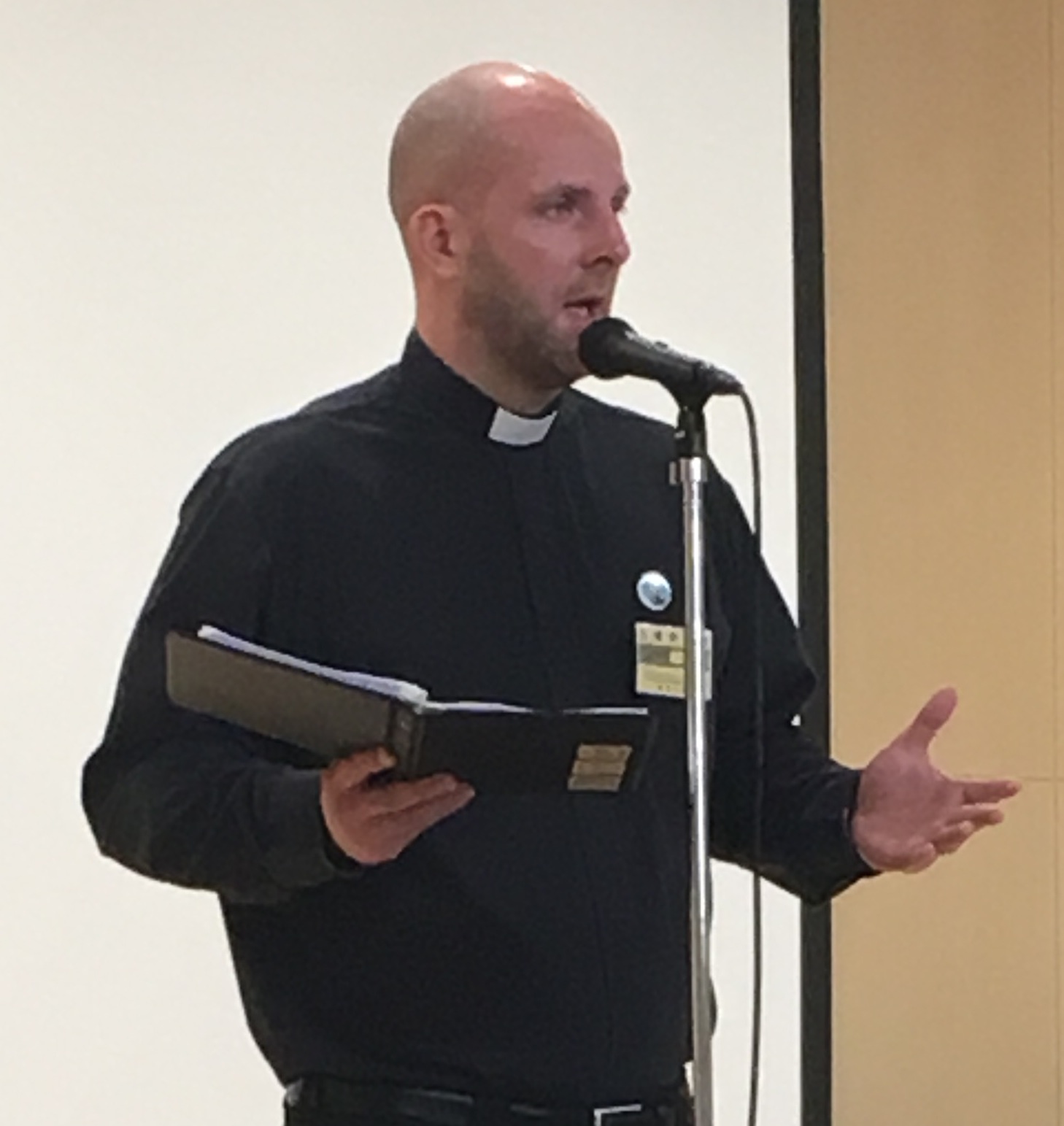 Rev. Gustav Ericsson (Sweden) is a Christian priest in the Lutheran Church of Sweden. After being ordained in 2010, he served as a hospital priest at the regional University Hospital of Umea in northern Sweden and at a hospice for palliative care. He is especially trained in pastoral counseling for crisis and grief, and one of his main interests is the meeting of meditation practice with pastoral care. He has practiced and studied Zen since the mid 1990’s and in 2004 received Dharma transmission from Japanese Soto Zen teacher Gudo Nishijima Roshi. Since 2010, he has also served as a counseling priest with the Lutheran Church’s national suicide prevention hotline, which is available by telephone through the national emergency number as well as chat rooms and mailbox online. Gustav presented and attended the 1st Round conference in Japan in 2017.
Rev. Gustav Ericsson (Sweden) is a Christian priest in the Lutheran Church of Sweden. After being ordained in 2010, he served as a hospital priest at the regional University Hospital of Umea in northern Sweden and at a hospice for palliative care. He is especially trained in pastoral counseling for crisis and grief, and one of his main interests is the meeting of meditation practice with pastoral care. He has practiced and studied Zen since the mid 1990’s and in 2004 received Dharma transmission from Japanese Soto Zen teacher Gudo Nishijima Roshi. Since 2010, he has also served as a counseling priest with the Lutheran Church’s national suicide prevention hotline, which is available by telephone through the national emergency number as well as chat rooms and mailbox online. Gustav presented and attended the 1st Round conference in Japan in 2017.
 Elaine Yuen (U.S.A.) was Associate Professor of Religious Studies and Chair of the Master of Divinity Program at Naropa University in Boulder, Colorado where she taught courses on spirituality and ritual, Buddhism, and pastoral care. She continues to present programs exploring the interfaces between Buddhism, meditation, creativity, and contemplative care-giving. Dr. Yuen is cross-trained as a social science researcher and is particularly interested in the relationship between meditation and the creative process. A Senior Teacher in the Shambhala Buddhist tradition, founded by Chogyam Trungpa Rinpoche in the early 1970’s, she explores contemporary life through many activities as a teacher, parent, and artist. Elaine presented and attended the 1st Round conference in Japan in 2017.
Elaine Yuen (U.S.A.) was Associate Professor of Religious Studies and Chair of the Master of Divinity Program at Naropa University in Boulder, Colorado where she taught courses on spirituality and ritual, Buddhism, and pastoral care. She continues to present programs exploring the interfaces between Buddhism, meditation, creativity, and contemplative care-giving. Dr. Yuen is cross-trained as a social science researcher and is particularly interested in the relationship between meditation and the creative process. A Senior Teacher in the Shambhala Buddhist tradition, founded by Chogyam Trungpa Rinpoche in the early 1970’s, she explores contemporary life through many activities as a teacher, parent, and artist. Elaine presented and attended the 1st Round conference in Japan in 2017.
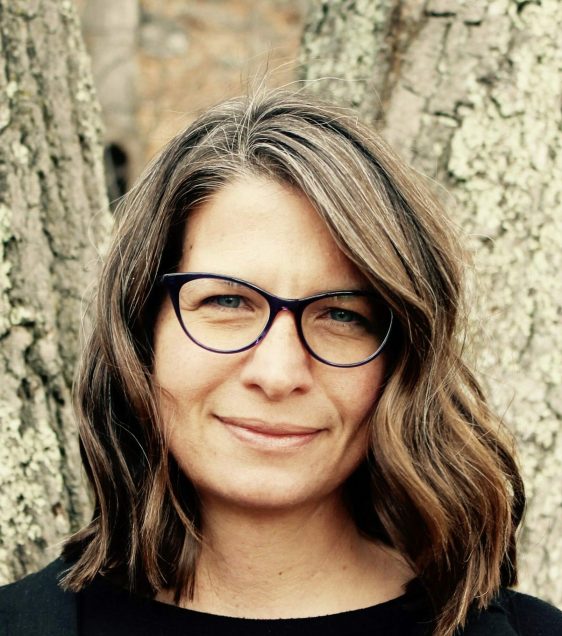 Rev. Brenda Caldwell Phillips (U.S.A.) is a chartered psychologist and Buddhist chaplain. She currently serves as co-director of the MSc Health Psychology Programme at the University of Derby (UK), and as academic consultant for the Buddhist Chaplaincy Training Program at Upaya Zen Center under Roshi Joan Halifax. Brenda develops mindfulness-based interventions for women with cancer, with the goal of decreasing their psychospiritual distress. She uses community-based research methods, which emphasize cultural humility, to meet the psychospiritual needs of Women of the Global Majority. She also designs studies that examine the impact of chaplaincy training and experience on patient outcomes in Eastern and Western contexts. As a chaplain, Brenda leads meditation support groups and provides end-of-life care to individuals with advanced cancer.
Rev. Brenda Caldwell Phillips (U.S.A.) is a chartered psychologist and Buddhist chaplain. She currently serves as co-director of the MSc Health Psychology Programme at the University of Derby (UK), and as academic consultant for the Buddhist Chaplaincy Training Program at Upaya Zen Center under Roshi Joan Halifax. Brenda develops mindfulness-based interventions for women with cancer, with the goal of decreasing their psychospiritual distress. She uses community-based research methods, which emphasize cultural humility, to meet the psychospiritual needs of Women of the Global Majority. She also designs studies that examine the impact of chaplaincy training and experience on patient outcomes in Eastern and Western contexts. As a chaplain, Brenda leads meditation support groups and provides end-of-life care to individuals with advanced cancer.
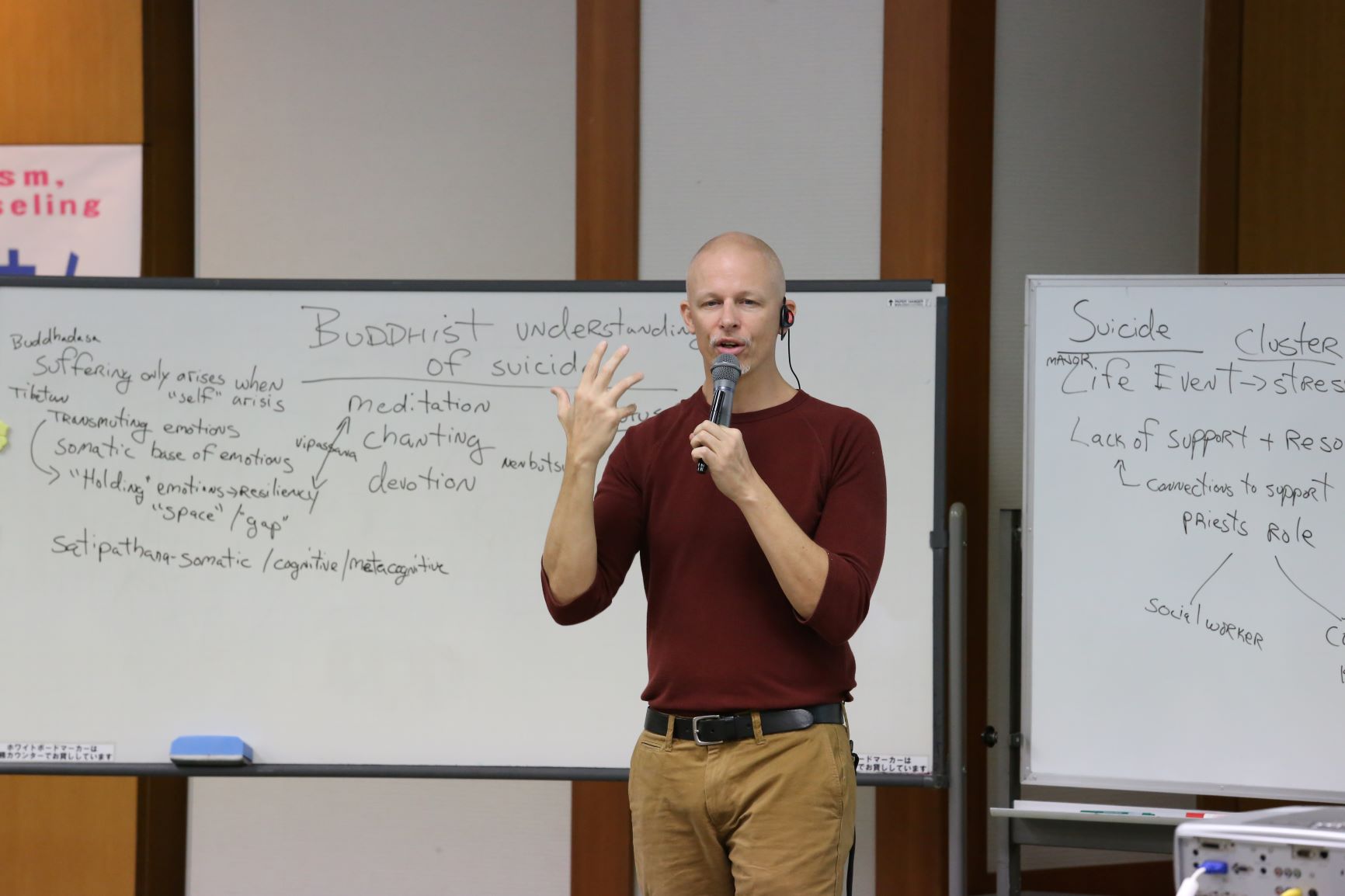 Jonathan Watts (U.S.A./Japan) graduated from Princeton University with a B.A. in Religious Studies and also a minor in Political Science. He immediately moved to Asia and spent three years working in the INEB Secretariat in Bangkok, while studying and practicing at the forest monastery of Buddhadasa Bhikkhu. In 1993, he moved to Japan and spent the decade coordinating the INEB Think Sangha, an engaged Buddhist “think tank” working on a variety of social issues. In 1999, he joined the Jodo Pure Land denomination research institute and edited and co-wrote Buddhist Care for the Dying and Bereaved with Rev. Yoshiharu Tomatsu. In 2006, he joined Kodo Kyodan’s International Buddhist Exchange Center (IBEC) from which he has been involved in a wide variety of engaged Buddhist issues in Japan–which will be the focus on a new major publication. Since this time, he has also helped develop Japan’s first Buddhist chaplaincy training program, the Rinbutsuken Institute of Engaged Buddhism, where he teaches Buddhist social analysis and systems care.
Jonathan Watts (U.S.A./Japan) graduated from Princeton University with a B.A. in Religious Studies and also a minor in Political Science. He immediately moved to Asia and spent three years working in the INEB Secretariat in Bangkok, while studying and practicing at the forest monastery of Buddhadasa Bhikkhu. In 1993, he moved to Japan and spent the decade coordinating the INEB Think Sangha, an engaged Buddhist “think tank” working on a variety of social issues. In 1999, he joined the Jodo Pure Land denomination research institute and edited and co-wrote Buddhist Care for the Dying and Bereaved with Rev. Yoshiharu Tomatsu. In 2006, he joined Kodo Kyodan’s International Buddhist Exchange Center (IBEC) from which he has been involved in a wide variety of engaged Buddhist issues in Japan–which will be the focus on a new major publication. Since this time, he has also helped develop Japan’s first Buddhist chaplaincy training program, the Rinbutsuken Institute of Engaged Buddhism, where he teaches Buddhist social analysis and systems care.
Participation:
The number of participants will be capped at forty persons, with a priority given to those from South and Southeast Asian, as well as a strong emphasis on gender balance. Participants do not have to be ordained monks or nuns but should be committed lay Buddhist practitioners. Participants should also already demonstrate a level commitment and activity to working in the field of compassionate care and chaplaincy.
Support a Participant: Many of the participants are both coming from and serve marginalized communities, such as Buddhist nuns in the Himalayan regions or lay peace workers in Myanmar. The opportunity to receive such higher training in chaplaincy and psycho-spiritual care is precious. Please consider sponsoring one or more participants with a donation for their program fees, just US$300/person. You can donate here through the website of the International Network of Engaged Buddhists. Please put in the comments section, “sponsorship for Buddhist chaolaincy workshop”.
Fees & Registration:
Fees for the program including food and lodging at the Wongsanit Ashram (photos above) are US$300. However, applicants may apply for reduced fees based on need. Private individuals with no organizational affiliation will also be considered for a reduction in costs. Please contact below and decribe: 1) your standing as a Buddhist practitioner (ordained, lay, level of training) and 2) your experience and/or goals as a caregiver.
Jonathan Watts – Coordinator
The International Buddhist Psychotherapy and Chaplaincy Working Group
International Buddhist Exchange Center (IBEC) @ Kodosan
Yokohama, Japan
e-mail: wattsj@jneb.net
or
Dexter Bohn – Communications Coordinator
International Network of Engaged Buddhists
Bangkok, Siam (Thailand)
e-mail: coordinator@inebnetwork.org
Website: www.inebnetwork.org